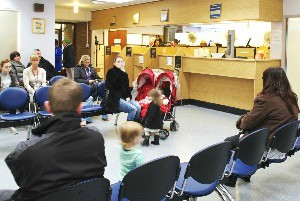A Scottish Government-funded trial to improve recruitment and retention of GPs in the most deprived practices has reported decreased levels of stress and a ‘renewed enthusiasm’ in just six months.
The Deep End Pioneer Scheme which is being tested in six practices in Glasgow provides funding for young GP ‘fellows’ in practices four days a week, freeing up senior GP time to take on extra projects which benefit their patients.
It has been designed to counter the impact of the inverse care law by increasing clinical capacity in practices with high levels of deprivation.
But also hopes to make such practices inspirational and attractive places to work.
One GP who is taking part in the pilot Dr Lynsay Crawford said they were on the brink of ‘handing back the keys and walking away’ before they signed up for the trial.
‘My partner and I had been in the practice 19 to 20 years and we were at breaking point.’
Dr Crawford, a partner at Balmore surgery in Possilpark – an area with the lowest life expectancy in the UK – explains they had told the health board they needed help and they were refused.
Hearing they had been selected for the scheme was a turning point.
‘We noticed a difference within a few weeks and it was a miracle,’ she says.
‘We can sleep at night, we no longer dread coming into work, we can sit and have a cup of tea and have a discussion with colleagues.’
A review of the project published in the Annals of Family Medicine says while the evaluation is at an early stage, the GPs involved ‘report a decrease in stress and renewed enthusiasm for their work’.
Patient benefits are also being assessed over the course of the study which has recently been extended to two years.
Dr Crawford explains they have a fellow who works three days a week seeing patients and one day on professional development.
The scheme also frees up time for the lead experienced GPs to focus on particular issues facing deprived practices.
Dr Crawford’s practice has already improved uptake for smear tests to over 80% for the first time in a long time after focusing on cancer screening.
They are also involved in projects on frequent attenders and services for asylum seekers.
‘We’re providing more appointments and we’re probably addressing more unmet need in the community’.
RCGP Scotland had already pointed out that the said the work of the Deep End Project has ‘unequivocally shown’ the improvements in patients quality of life that can be achieved by investing in GP care in deprived areas and has called on promised government investment to be targeted at tackling health inequality.
Dr Crawford says she remains deeply concerned that the new contract currently under negotiation will not improve funding for the Deep End practices.
‘I am concerned that we will continue the inverse care law. We can’t deny the massive impact that deprivation has on workload.’

















